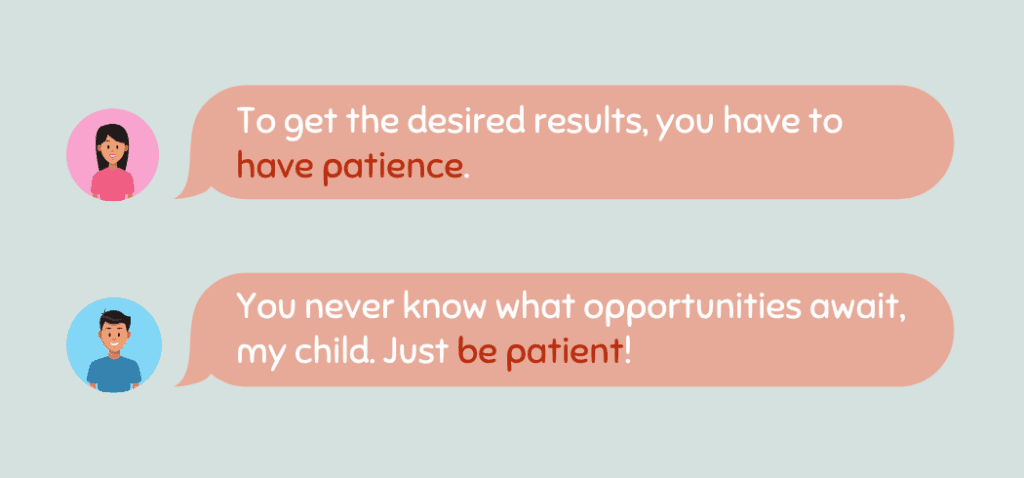Have you ever wondered what it meant to be patient with someone? Or how to properly use “be patient” or “have patience” in a sentence? Today’s lesson is about understanding when to use these two phrases in a sentence.
Is It Be Patient or Have Patience?
“Be patient” and “have patience” essentially mean the same thing but are typically used in different situations. “Be patient” is considered a more informal way to tell someone to “have patience.”
The noun patient refers to a person seeing a doctor, usually. But when paired with the word be, it becomes an adjective of the noun patience.
“Be Patient” vs. “Have Patience”: Knowing the Difference in Meaning
Many of us have likely heard the phrase “have patience.” But is there a difference between this expression and its close relative “be patient”? The answer may not seem obvious initially, but a closer look reveals several key differences between these two concepts.
The main distinction between the two phrases lies in their definitions.
While patience typically refers to an attribute of calm endurance or tolerance for delay, having patience can also be understood as actively pursuing a goal through determination and hard work.
The very etymology of the word “patience” indicates this difference: originated from the Latin verb patior, which means “to suffer,” it implies acceptance and resignation to whatever fate might lay ahead rather than aggression or action.
In other words, patience requires proactive engagement with the world around us; we must push forward even when it feels like nothing is happening or changing.
Therefore, while both phrases convey a sense of persevering through difficulties, they mean something subtly different in intention and meaning and are best used accordingly.
Here are some examples:
- Please have patience; the doctor will see you in a moment.
- To get the desired results, you have to have patience.
- You never know what opportunities await, my child. Just be patient!
When using the phrases be patient and have patience, both are correct when asking someone to wait for something. However, be patient is more direct and assertive, whereas have patience sounds more like a suggestion rather than a demand.
The Structure of “Be Patient” and “Have Patience”
Both “be” and “have” are auxiliary verbs. The first one shows existence, while the other is used to reflect possession.
“Patient” has a double role, as it can be a noun or an adjective. As a noun, “patient” is a term to describe someone who needs medical care. As an adjective, it describes someone tolerant and calm.
The Semantics of “Be Patient” and “Have Patience”
When we combine “be” with “patient,” we get a phrase that means “becoming calm.”
On the other hand, to “have patience” means you already own patience to some extent.
Because these two structures are so similar in meaning, you can use any of these in different situations, and the message receiver will fully understand what you’re trying to express.
Note, however, that “have patience” is more formal than “be patient” (which sounds more like you’re commanding someone to show signs of calm).
Is It Correct to Say Be Patient With Me?
It’s common for us to use the phrase “be patient with me” when we’re seeking understanding and support from others. So yes, it is correct!
What Does Having Patience Mean?
“Having patience” is understood as an admirable trait that can be cultivated over time through effort and good decisions. For example, one might advise a friend to have patience by saying, “Just keep working hard and your success will come eventually.”
Whether you’re focusing on exercising patience or cultivating more enduring qualities of fortitude and tolerance, both meanings imply that you need to make an active choice to be more patient – regardless of what situation you might be in at any given moment.
Which Is Correct Be Patient or Be Patience?
The correct form is to “be patient” or to “have patience.” You can never combine be and patience.
Bottom Line
“Be patient” means to become calm, while “have patience” implies that you already own the trait of patience to some extent. I hope my little guide helped you better understand!

